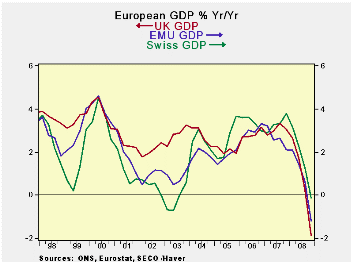 Global| Mar 03 2009
Global| Mar 03 2009Swiss GDP: In The Soup With The Rest Of Europe
Summary
Swiss GDP is taking a hit like the rest of European GDP. Capital formation in Switzerland is being hit especially hard. Switzerland, the graph above shows, has been somewhat resistant to decline in its GDP aggregate until recently [...]

Swiss GDP is taking a hit like the rest of European GDP.
Capital formation in Switzerland is being hit especially hard.
Switzerland, the graph above shows, has been somewhat resistant to
decline in its GDP aggregate until recently when the drop has been very
severe. With banking as a key Swiss industry and the economy hit so
hard, it is no wonder than Switzerland has been drawn into the vortex
of European decline. Switzerland is also a trade-dependent country with
exports plus imports topping aggregate GDP in value. Exports are more
than 50% of GDP by themselves. With the European economy in a shambles,
Swiss exports are being clobbered. Of course Switzerland imports a lot
too, and imports have fallen in percentage terms even more than exports
for the year, but not for the quarter. The trade situation is a big
detractor to Swiss GDP over the quarter as well as over the year due to
the relative size of exports in the Swiss economy.
So far Switzerland has weathered the storm of European
weakness by pumping up government spending. Public sector spending was
up at a 2.9% pace in Q4 and is up by 3.4% Yr/Yr. That helped to drive
up domestic demand in the quarter but Yr/Yr domestic demand is still
dropping. Europe’s weakness has Switzerland fully in its grasp and the
troubles in Swiss banking will pose an added problem for the Swiss
authorities, trying to the keep the economy afloat.
Longer term, Switzerland’s banking sector may prove to be even
more of a problem. With a global banking crisis in full bloom the rest
of the world is pushing hard for transparency. Switzerland has long
held a unique position in the global markets with bank secrecy. But
banking problems have become so severe that in the European summit of
one week ago the Europeans called for strong actions against tax
havens. UBS, a major Swiss bank, currently is embroiled in a major
fight in the US where it helped US citizens perpetrate tax fraud. The
Americans are pushing for the release of the names of about 50,000
American citizens that have accounts at UBS. UBS has offered up a much
smaller number of about 250 names. US authorities are pressing UBS and
do not seem likely to accept interventions by the Swiss authorities as
cover. Although the situation gets complicated because a suit filed in
Switzerland is trying to enjoin UBS from releasing these names as it is
a crime – a violation of Swiss bank secrecy laws - to do so. The issue
and question of bank secrecy and whether it will remain a right is now
under a full court press. With so many scandals and allegations of
fraud in play the international banking authorities do not want to
encounter and black box of secrecy at the end of their chase- as is
happening to the US right now. To Switzerland this is a very important
issue- but it is also important to other banking sectors where
authorities have become increasing suspicious of secrecy anywhere.
| Swiss GDP | |||||||
|---|---|---|---|---|---|---|---|
| Consumption | Capital | Trade Domestic | |||||
| GDP | Private | Public | Formation | Exports | Imports | Demand | |
| % change Q/Q | |||||||
| Q4-08 | -1.2% | 0.4% | 2.9% | -12.0% | -28.5% | -21.3% | 7.6% |
| Q3-08 | -0.3% | 0.5% | 5.7% | -7.2% | 1.1% | -2.9% | -2.5% |
| Q2-08 | 0.5% | 2.5% | 3.2% | -2.9% | 14.0% | 14.0% | -1.1% |
| Q1-08 | 0.5% | 0.6% | 1.7% | 1.1% | -2.7% | -12.0% | -4.2% |
| % change Yr/Yr | |||||||
| Q4-08 | -0.1% | 1.0% | 3.4% | -5.4% | -5.4% | -6.4% | -0.1% |
| Q3-08 | 1.3% | 1.5% | 1.2% | -1.3% | 4.9% | 2.0% | -0.6% |
| Q2-08 | 2.3% | 2.2% | -1.8% | -2.0% | 6.5% | 3.4% | 0.3% |
| Q1-08 | 3.1% | 2.2% | -2.6% | 1.9% | 3.7% | 0.3% | 1.4% |
| 5-Yrs | 2.5% | 1.7% | 0.1% | 2.0% | 5.5% | 3.5% | 1.3% |
Robert Brusca
AuthorMore in Author Profile »Robert A. Brusca is Chief Economist of Fact and Opinion Economics, a consulting firm he founded in Manhattan. He has been an economist on Wall Street for over 25 years. He has visited central banking and large institutional clients in over 30 countries in his career as an economist. Mr. Brusca was a Divisional Research Chief at the Federal Reserve Bank of NY (Chief of the International Financial markets Division), a Fed Watcher at Irving Trust and Chief Economist at Nikko Securities International. He is widely quoted and appears in various media. Mr. Brusca holds an MA and Ph.D. in economics from Michigan State University and a BA in Economics from the University of Michigan. His research pursues his strong interests in non aligned policy economics as well as international economics. FAO Economics’ research targets investors to assist them in making better investment decisions in stocks, bonds and in a variety of international assets. The company does not manage money and has no conflicts in giving economic advice.
More Economy in Brief
 Global| Feb 05 2026
Global| Feb 05 2026Charts of the Week: Balanced Policy, Resilient Data and AI Narratives
by:Andrew Cates






